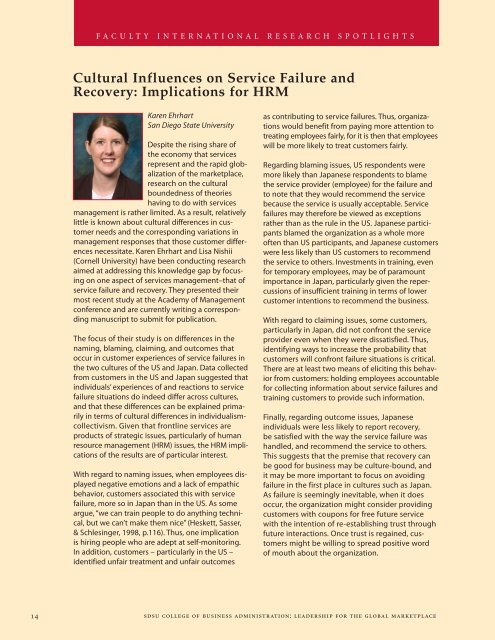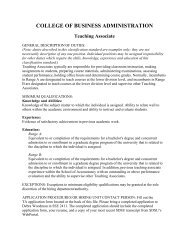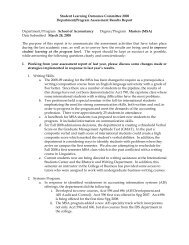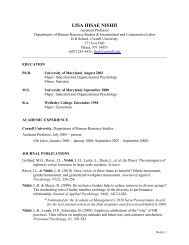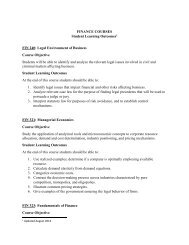Leadership for the Global Marketplace - The College of Business ...
Leadership for the Global Marketplace - The College of Business ...
Leadership for the Global Marketplace - The College of Business ...
- No tags were found...
You also want an ePaper? Increase the reach of your titles
YUMPU automatically turns print PDFs into web optimized ePapers that Google loves.
FACULTY INTERNATIONAL RESEARCH SPOTLIGHTSCultural Influences on Service Failure andRecovery: Implications <strong>for</strong> HRMKaren EhrhartSan Diego State UniversityDespite <strong>the</strong> rising share <strong>of</strong><strong>the</strong> economy that servicesrepresent and <strong>the</strong> rapid globalization<strong>of</strong> <strong>the</strong> marketplace,research on <strong>the</strong> culturalboundedness <strong>of</strong> <strong>the</strong>orieshaving to do with servicesmanagement is ra<strong>the</strong>r limited. As a result, relativelylittle is known about cultural differences in customerneeds and <strong>the</strong> corresponding variations inmanagement responses that those customer differencesnecessitate. Karen Ehrhart and Lisa Nishii(Cornell University) have been conducting researchaimed at addressing this knowledge gap by focusingon one aspect <strong>of</strong> services management–that <strong>of</strong>service failure and recovery. <strong>The</strong>y presented <strong>the</strong>irmost recent study at <strong>the</strong> Academy <strong>of</strong> Managementconference and are currently writing a correspondingmanuscript to submit <strong>for</strong> publication.<strong>The</strong> focus <strong>of</strong> <strong>the</strong>ir study is on differences in <strong>the</strong>naming, blaming, claiming, and outcomes thatoccur in customer experiences <strong>of</strong> service failures in<strong>the</strong> two cultures <strong>of</strong> <strong>the</strong> US and Japan. Data collectedfrom customers in <strong>the</strong> US and Japan suggested thatindividuals’ experiences <strong>of</strong> and reactions to servicefailure situations do indeed differ across cultures,and that <strong>the</strong>se differences can be explained primarilyin terms <strong>of</strong> cultural differences in individualismcollectivism.Given that frontline services areproducts <strong>of</strong> strategic issues, particularly <strong>of</strong> humanresource management (HRM) issues, <strong>the</strong> HRM implications<strong>of</strong> <strong>the</strong> results are <strong>of</strong> particular interest.With regard to naming issues, when employees displayednegative emotions and a lack <strong>of</strong> empathicbehavior, customers associated this with servicefailure, more so in Japan than in <strong>the</strong> US. As someargue, “we can train people to do anything technical,but we can’t make <strong>the</strong>m nice” (Heskett, Sasser,& Schlesinger, 1998, p.116). Thus, one implicationis hiring people who are adept at self-monitoring.In addition, customers – particularly in <strong>the</strong> US –identified unfair treatment and unfair outcomesas contributing to service failures. Thus, organizationswould benefit from paying more attention totreating employees fairly, <strong>for</strong> it is <strong>the</strong>n that employeeswill be more likely to treat customers fairly.Regarding blaming issues, US respondents weremore likely than Japanese respondents to blame<strong>the</strong> service provider (employee) <strong>for</strong> <strong>the</strong> failure andto note that <strong>the</strong>y would recommend <strong>the</strong> servicebecause <strong>the</strong> service is usually acceptable. Servicefailures may <strong>the</strong>re<strong>for</strong>e be viewed as exceptionsra<strong>the</strong>r than as <strong>the</strong> rule in <strong>the</strong> US. Japanese participantsblamed <strong>the</strong> organization as a whole more<strong>of</strong>ten than US participants, and Japanese customerswere less likely than US customers to recommend<strong>the</strong> service to o<strong>the</strong>rs. Investments in training, even<strong>for</strong> temporary employees, may be <strong>of</strong> paramountimportance in Japan, particularly given <strong>the</strong> repercussions<strong>of</strong> insufficient training in terms <strong>of</strong> lowercustomer intentions to recommend <strong>the</strong> business.With regard to claiming issues, some customers,particularly in Japan, did not confront <strong>the</strong> serviceprovider even when <strong>the</strong>y were dissatisfied. Thus,identifying ways to increase <strong>the</strong> probability thatcustomers will confront failure situations is critical.<strong>The</strong>re are at least two means <strong>of</strong> eliciting this behaviorfrom customers: holding employees accountable<strong>for</strong> collecting in<strong>for</strong>mation about service failures andtraining customers to provide such in<strong>for</strong>mation.Finally, regarding outcome issues, Japaneseindividuals were less likely to report recovery,be satisfied with <strong>the</strong> way <strong>the</strong> service failure washandled, and recommend <strong>the</strong> service to o<strong>the</strong>rs.This suggests that <strong>the</strong> premise that recovery canbe good <strong>for</strong> business may be culture-bound, andit may be more important to focus on avoidingfailure in <strong>the</strong> first place in cultures such as Japan.As failure is seemingly inevitable, when it doesoccur, <strong>the</strong> organization might consider providingcustomers with coupons <strong>for</strong> free future servicewith <strong>the</strong> intention <strong>of</strong> re-establishing trust throughfuture interactions. Once trust is regained, customersmight be willing to spread positive word<strong>of</strong> mouth about <strong>the</strong> organization.14 sdsu college <strong>of</strong> business administration: leadership <strong>for</strong> <strong>the</strong> global marketplace


